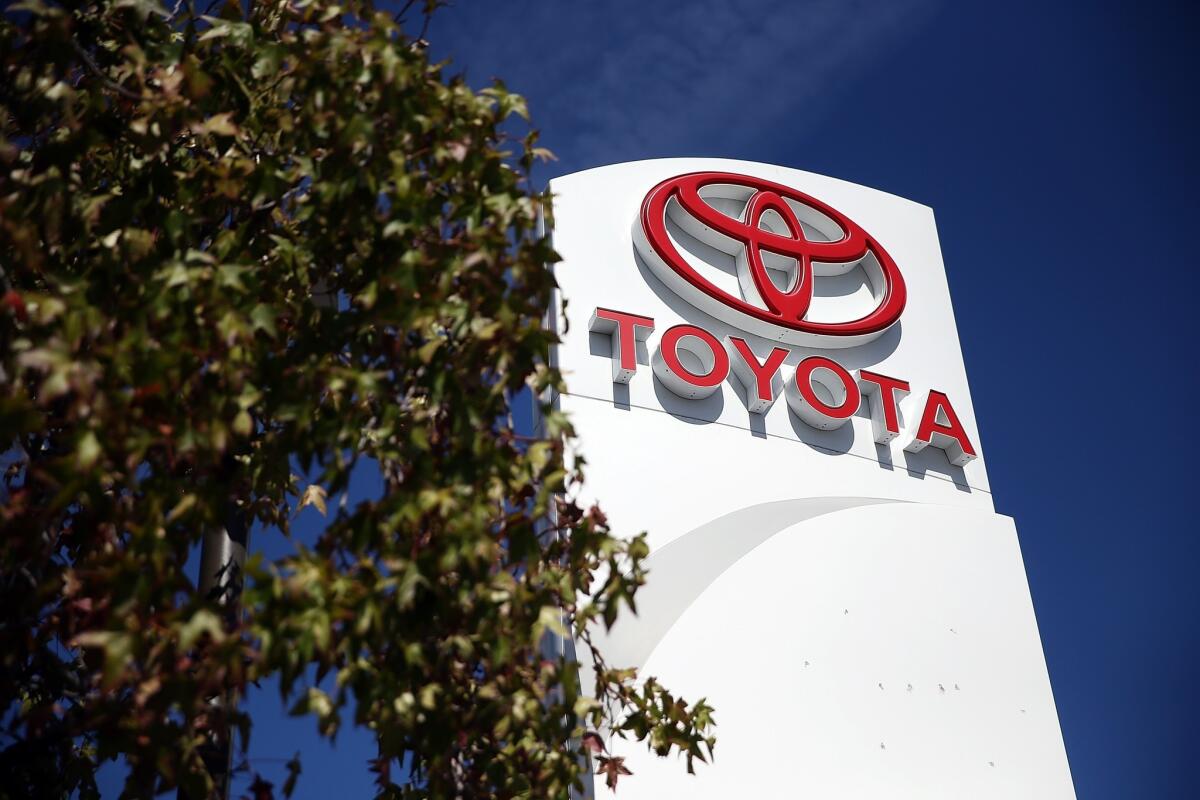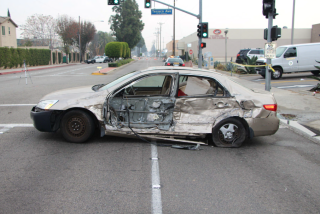Toyota settles acceleration lawsuit after $3-million verdict

- Share via
Toyota Motor Corp.’s first loss in a sudden acceleration case, in an Oklahoma courtroom this week, could embolden attorneys nationwide who are looking to bring hundreds of similar cases.
Worse for the Japanese automaker, the verdict centered on the company’s electronics, which have been a focus for plaintiffs seeking to prove safety defects in the company’s cars.
Toyota on Friday confirmed that it had reached a confidential settlement in the lawsuit, which involved the fatal 2007 crash of a Camry. The settlement came hours after a jury assessed $3 million in compensatory damages but before the panel could levy a punitive award.
The verdict could provide a road map for attorneys seeking to hold the automaker liable for injuries and deaths.
Toyota has denied any safety defects in its cars, arguing that many incidents of unintended acceleration stemmed from drivers who stepped on the gas instead of the brake. But plaintiffs in the Oklahoma case successfully argued that Toyota’s electronic throttle system was flawed, causing the car to speed out of control.
The 2005 Camry crashed into an embankment, severely injuring the driver, 76-year-old Jean Bookout, and killing her passenger, Barbara Schwarz.
By striking a quick settlement, the company likely sought to avoid bad publicity and damage to its reputation, said Jill Wieber Lens, a product liability expert at Baylor University Law School in Waco, Texas.
The Oklahoma defeat could increase pressure on the automaker to come up with a mass settlement to curtail its risk, product liability experts said, particularly if more court losses follow.
Corporations do exhaustive financial and strategic analysis before making such decisions.
“At some point,” said Lens, “Toyota will want to evaluate whether a mass settlement is a better option than continuing to litigate the individual claims.”
Toyota declined to discuss details of the case or what it means for its legal strategy.
“While we strongly disagree with the verdict, we are satisfied that the parties reached a mutually acceptable agreement to settle this case,” said Toyota spokeswoman Carly Schaffner.
Already, attorneys around the country are examining the case to help prepare for their own lawsuits against Toyota.
In particular, attorneys are studying the evidence presented by Michael Barr, a software expert who combed through the Toyota source code in the Camry’s throttle system. He testified that multiple problems with the software controlling Toyota’s throttle system could have caused the Camry to accelerate out of control in the 2007 crash.
“Toyota vehicles with software-controlled throttles remain a danger to the public,” Barr told The Times after the verdict.
Although Toyota has won three prior jury verdicts — most recently a case in Los Angeles this month — none alleged the software defect that was in Barr’s testimony.
Similar testimony is likely to appear in many of the coming trials involving Toyota, said Don Slavik, an attorney handling a handful of cases against the automaker.
“We’re seeing a multitude of problems that come about as a result of faulty software,” Slavik said, noting that some cars were already moving when they accelerated, while others took off from a standstill. “All our experts say that this is a result of bad code.”
The next test of the electronics glitch theory will come Nov. 5 in U.S District Court in Santa Ana. Attorneys for the heirs of Ida Starr St. John plan to argue that defective software caused her Camry to accelerate and crash into the side of a Georgia schoolhouse. (St. John later died of other causes.)
That argument may be harder to win. Federal court requires a unanimous verdict. In the Oklahoma case, the verdict was split with at least nine jurors, the minimum required for a decision, voting for the plaintiffs.
Toyota has been struggling to move beyond the sudden acceleration issue for years. It has recalled millions of vehicles to fix issues with gas pedals and floor mats that it said could cause sudden acceleration.
The automaker also settled the most high-profile cases, including a $10-million deal reached in 2010 with the survivors of a California Highway Patrol officer and three family members who were killed in a runaway Lexus ES outside San Diego.
Late last year, the company agreed to pay $1.6 billion to settle a class-action case brought by thousands of Toyota owners who contended that the sudden acceleration problem damaged the value of their vehicles.
At the same time, Toyota has executed a sweeping campaign to assure the public that its vehicles are sound. It pointed to a NASA study that found no flaws in the vehicles’ electronics and built its marketing message around Toyota’s reputation for building dependable cars.
“We remain committed to providing our customers with safe and reliable vehicles,” Schaffner said.
When the Oklahoma City trial opened nearly three weeks ago, plaintiff attorney Jere L. Beasley was concerned that the jury would be favorably disposed to Toyota.
But after the jury’s verdict, the automaker quickly moved to settle, even though the state caps its punitive damages to 100% of the compensatory award. That would have put Toyota’s maximum liability at $6 million.
Beasley said the jurors had intended to levy a heavier penalty.
“When the judge told them there was a cap, they were shocked,” Beasley said. “Ten of the 12 said they wanted to punish Toyota.”







